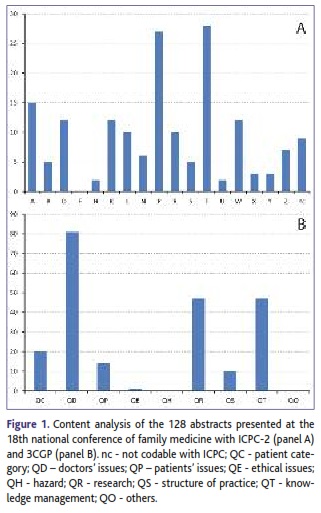Services on Demand
Journal
Article
Indicators
-
 Cited by SciELO
Cited by SciELO -
 Access statistics
Access statistics
Related links
-
 Similars in
SciELO
Similars in
SciELO
Share
Revista Portuguesa de Medicina Geral e Familiar
Print version ISSN 2182-5173
Rev Port Med Geral Fam vol.29 no.5 Lisboa Sept. 2013
CARTA À DIRECTORA
Using the International Classification for Primary Care (ICPC) and the Core Content Classification for General Practice (3CGP) to classify conference abstracts
Utilização da Classificação Internacional de Cuidados Primários (ICPC) e da Classificação do Conteúdo Nuclear de Clínica Geral (3CGP) para classificar resumos de congressos
Marc Jamoulle*
*Family practitioner and researcher in Primary Care IRSS UCL, member of the Wonca International Classification Committee
Endereço para correspondência | Dirección para correspondencia | Correspondence
Family medicine is like the Danaïds barrel, a bottomless pit of knowledge. Each year, thousands of general practitioners (GPs) hypothesize, develop research, gather data, elaborate reports and present their work. Much of this knowledge will be lost or remain hidden because only a few of these studies will be published in medical journals.1 Books of abstracts are not readily accessible or, if published, are difficult to search. The WONCA Europe web site has gathered abstracts from 1995 to the present but there is no indexation system to retrieve specific subjects.
There have been several attempts to index the WONCA Europe and World conference abstracts with the International Classification of Primary Care (ICPC). This did not work. ICPC only address clinical situations and is unfit for non-clinical issues.
In the 1980s, Professor Henk Lamberts from Amsterdam University developed a classification called Q codes (as Q is not used in ICPC) to index, jointly with ICPC, the main publications of medical journals. In 2006, reusing the Q codes, I developed a classification of non-clinical issues addressed by GPs called 3CGP2 allowing indexation of WONCA congress communications. 3CGP stands for Core Content Classification in General Practice/Family Medicine, and contains 164 rubrics divided in 8 domains, subdivided in categories and subcategories. To develop it, I have personally indexed the 1000 abstracts of the Paris congress in 2007 and presented my work during this conference.3 This work has lain dormant for 6 years and opened one eye in June 2013 in Belém, Brazil, during the Sociedade Brasileira de Medicina de Família e Comunidade conference. The organizers of the 2016 WONCA World conference in Rio de Janeiro are looking for an abstract indexation system and have also expressed interest in 3CGP.
In the Portuguese mountains in Covilhã the idea woke up for good. I was invited to the Portuguese 18th national conference of family medicine and read with interest the Livro de Resumos (book of abstracts). The 128 abstracts of very interesting work done by so many young and enthusiastic GPs have been indexed with 3CGP and ICPC. I present here the main results of this work. (Full data available on request.)
203 ICPC codes were used to classify 119 abstracts. Nine abstracts were not codable by ICPC (Figure 1). 36 codes were in component 1 (symptoms – complaints), 123 in component 7 (diagnosis) and 44 were process codes, of which 30 were related to drug prescription (-50) and only one about referral (-67). Chapters P, T, W and Z were overrepresented. There were 8 communications about depression (P76), 4 on dementia (P70) and five on tobacco issues (P17). The overwhelming predominance of the T chapter is due to studies on the combination of diabetes, obesity and lipid issues, always attractive for young doctors. Less expected were 8 communications about pregnancy and 7 addressing social issues.
With 3CGP one sees 36 communications describing disease (QD32 health issue management), 6 concerning children (QC11), 8 about aged people (QC14), 6 about relationships with secondary care (QS2). First place goes to Teaching (39 QT53 critical reading) and Research (25 QR2 epidemiology). 4 dealt with primary prevention (QD41), 12 with secondary (QD42), 4 with tertiary (QD43) and 8 with quaternary prevention (QD44). Only one paper addressed ethical issues.
These two tools show that GPs presenting in Covilhã preferred diseases (QD32 and component 7), screening for them (QD42), drugs (-50) and the so-called metabolic syndrome (diabetes, obesity and lipid disorders) but were also deeply interested in mental health, social problems and pregnancy. The influence of teachers and vocational training is evident with many communications about epidemiological research (QR2) and critical reading (QT53).
Much remains to be done before 3CGP becomes a professional tool allowing participants to search their preferred domain in a conference program, but yet one can have a look at abstracts from a different angle. Just like the paper presented in Covilhã, which shows the value of of quebra-cabeças (jigsaw puzzles) for preventing dementia,4 3CGP allows me to activate my neurons by following the interests of the young generation of dedicated doctors.
REFERENCES
1. Hummers-pradier E, Stöcker J, Fischer T. Which Abstracts Do Get Published? – Output Of German Gp Research 1999-2003 (Internet). WONCA Europe Conference; 2007 Oct; Paris, France. Available from: http://www.woncaeurope.org/content/which-abstracts-do-get-published-%E2%80%93-output-german-gp-research-1999-2003 [ Links ]
2. Jamoulle M. Core Content Classification of General Practice / Family Medicine (3CGP) ver 0.2 Oct 2007 (Internet). Available from: http://docpatient.net/mj/wonca2007/3CGPFMdeskcopy.pdf [ Links ]
3 Jamoulle M, Hullers-Pradier E, Duhot D, Letrilliart L, Gay B. Towards an e-archive for Wonca documents. Workshop. Wonca Europe Conference; 2007 Oct. Paris, France. Available from: http://docpatient.net/mj/wonca2007/243.htm [ Links ]
4. Maltez R, Sá MJ, Gonçalves R. Terceira ronda: a idade em que os quebra-cabeças, quebram demência? Livro de resumos. C0353. 18° Congr. Nac. Med. Geral e Fam. 2013. [ Links ]
Endereço para correspondência | Dirección para correspondencia | Correspondence
Conflict of interest statement
The author has no conflict of interest in the publication of this letter and is the creator of the Core Content Classification for General Practice (3CGP).















